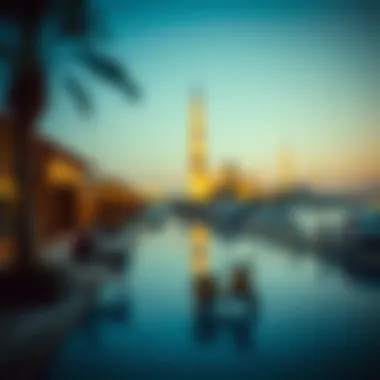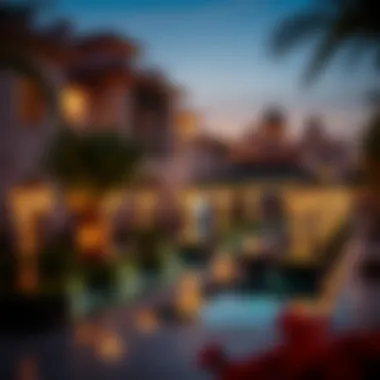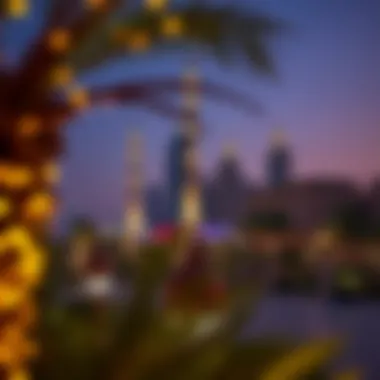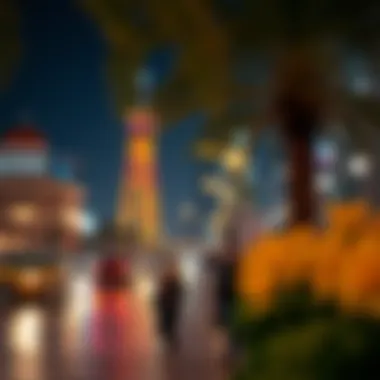Public Holidays in Dubai 2024: Essential Insights


Intro
Dubai, a city that epitomizes innovation and luxury, stands as a melting pot of traditions and cultures. Each year, a set of public holidays punctuates the calendar, serving not just as breaks from work, but also as vibrant cultural exhibitions. As 2024 unfolds, understanding these public holidays becomes crucial for both residents and visitors. Not only do these occasions mark significant cultural events and traditions, but they also influence various aspects of life, including real estate dynamics and personal lifestyle choices.
In this guide, we will explore the core public holidays of Dubai for 2024, shedding light on their cultural significance, practical implications, and how they intertwine with property trends in the city. Navigating through holidays can give potential investors and residents valuable insights into living in this remarkable city, ensuring they do not miss out on opportunities that may arise during these pivotal times.
Property Trends in Dubai
As we step into 2024, the property market in Dubai continues to evolve, reflecting the city’s ongoing development and its rising status as a global hub. Understanding property trends in relation to public holidays can reveal a lot about the city’s real estate landscape.
Current Market Overview
The real estate market in Dubai is buzzing with activity. Even though there are global economic fluctuations, Dubai has remained resilient. In recent years, the introduction of new regulations and initiatives aimed at attracting foreign investment has led to a remarkable increase in property transactions. Many are drawn to Dubai's off-plan projects, smart city developments, and luxurious amenities.
Property values are experiencing upward pressure due to high demand, especially in established districts like Dubai Marina and downtown areas. However, newer developments in up-and-coming neighborhoods like Dubai Hills and Mohammed Bin Rashid City are also garnering attention.
Overview of Public Holidays in Dubai
Understanding the public holidays in Dubai is fundamental for anyone interested in the dynamics of the city, especially for real estate investors, buyers, and renters. These holidays serve not only as a break from the routine but also reflect the cultural ethos that shapes the daily lives of residents. Knowing the dates and significance of these holidays can make a significant difference in planning investments, property rentals, and even daily activities.
Importance of Public Holidays
Public holidays in Dubai have various layers of importance, both social and economic. They act as a time for citizens and residents alike to come together and celebrate shared values.
- Time for Family: Many holiday periods see families gather, enhancing community bonds.
- Economic Activity: Holidays often lead to boosts in sectors such as retail, hospitality, and tourism. Businesses see an increase in footfall, and this can impact property demand.
- Cultural Education: Through the observance of public holidays, both locals and expatriates gain insight into the rich tapestry of Emirati culture. Understanding these can be pivotal for foreigners navigating Dubai’s vibrant market.
Moreover, public holidays dictate an array of activities across the city. For instance, festive markets spring to life during holidays, offering unique products and experiences that attract both locals and tourists.
Cultural Significance
Cultural significance within the context of public holidays in Dubai cannot be overstated. These holidays help reinforce the cultural heritage of the UAE, providing a backdrop for various traditional practices and gatherings. They represent moments of reflection, joy, and community connection among residents.
- Islamic Holidays: The major holidays, like Eid al-Fitr and Eid al-Adha, embody core Islamic values, emphasizing charity, family, and collective remembrance.
- National Pride: Celebrations such as UAE National Day foster a sense of pride and identity among Emiratis and residents. These are occasions to reflect on the nation’s achievements and aspirations.
- Cultural Exchange: For expatriates, these holidays provide a golden opportunity to engage with local customs and traditions, fostering a multicultural environment that Dubai is famous for.
In summary, public holidays in Dubai are not merely days off work; they are vivid expressions of community spirit, cultural richness, and economic opportunity. Understanding these aspects equips anyone in Dubai—whether a resident or an investor—with the knowledge to navigate the city intelligently.
Key Public Holidays in
Public holidays in Dubai are not just days off from work. They carry significant cultural weight. Each holiday has its unique traditions and observances that span centuries. Understanding these holidays is essential for any investor, renter, or visitor. They impact various sectors, including real estate, retail, and tourism.
Moreover, public holidays influence the rhythms of daily life in Dubai. Many businesses adjust their hours, and people often make plans for family gatherings or travel during these times. Without a grasp of when these holidays occur, one can miss out on valuable opportunities in both lifestyle and investment.
New Year's Day


New Year’s Day is widely celebrated on January 1st, marking the transition into a new year. In Dubai, it’s not just a party; it’s a chance for people to reflect on their lives and set new goals. The city lights up with fireworks and celebrations, with prominent displays at locations like Burj Khalifa. For those involved in real estate, the festive spirit can drive demand in the rental market as people seek accommodations for celebrations.
Eid Al-Fitr
Dates and Duration
Eid Al-Fitr marks the end of Ramadan, the month of fasting. This year, it is expected to begin on April 10 and last for three days. The anticipated dates might shift slightly due to the lunar calendar. With the end of fasting, there's a palpable excitement. It brings families together for festive meals and gifts, fostering a sense of community. The holiday can boost economic activity, especially in retail and hospitality.
Celebratory Traditions
During Eid Al-Fitr, traditions abound. From special prayers at mosques to sharing traditional meals, the communal feeling is strong. Gifts, known as "Eidiyah," are a common practice. This sharing enhances social bonds and builds goodwill among residents, thereby benefiting local businesses. Festivals, fairs, and events pop up across the city, creating a lively atmosphere for both residents and visitors.
Arafat Day
Arafat Day falls on the second day of the Hajj pilgrimage. It serves as a day of fasting and prayer before Eid Al-Adha begins. It’s deeply significant in Islamic culture as it symbolizes forgiveness and renewal. While less publicized than Eid, it still holds importance for many residents in Dubai who partake in devotional practices, shaping a profound sense of spirituality in the community.
Eid Al-Adha
Understanding the Holiday
Eid Al-Adha, or the "Festival of Sacrifice," begins on June 17 this year. It commemorates the willingness of Ibrahim to sacrifice his son. Observers perform prayers and sacrifice animals, sharing the meat with family, friends, and those in need. It’s a time for charitable acts, deepening community ties while also inviting a spirit of giving.
Observances in Dubai
In Dubai, Eid Al-Adha is marked by significant public celebrations, showcasing events filled with activities suitable for families. Food stalls, entertainment, and cultural exhibitions take place throughout the city. Such features attract not only locals but also tourists, enhancing the economic landscape during these days.
Islamic New Year
The Islamic New Year is a time for reflection and renewal. This year, it is set for July 7. Unlike the Gregorian calendar, the Islamic calendar is lunar. It's a quieter holiday in comparison to others but still offers an opportunity for prayer and personal growth. In the real estate context, insights into the pace of the market can be gleaned from activities surrounding this holiday.
Prophet Muhammad's Birthday
On September 15, Dubai observes the birthday of the Prophet Muhammad, also known as Mawlid. This day is marked by prayers and discussions centered on the teachings of the Prophet. While it may not lead to extensive public celebrations like Eid, its impact on the community spirit should not be underestimated.
Commemoration Day
Commemoration Day falls on November 30, and it serves to honor those who have given their lives in service to the UAE. Ceremonies and memorials are a common sight across the emirates, bringing people together in remembrance. Understanding this holiday offers a glimpse into the values that Dubai cherishes, reflecting a strong sense of national pride.
National Day
Festivities and Events
On December 2, Dubai celebrates its National Day. The atmosphere is electric as the city comes alive with parades, concerts, and firework displays that light up the sky. This holiday celebrates the unity of the Emirates. For those interested in real estate, this day can serve to highlight the country's growth and the opportunities available.
Impact on the City


National Day brings a surge of visitors and residents alike, boosting local businesses and encouraging tourism in the city. The positive impact on the economy is clear as festivities create an interconnectedness among residents. Agents and investors should take note of the surge in market activity that typically coincides with this holiday.
Effects of Public Holidays on Real Estate
Understanding the effects of public holidays on real estate in Dubai is crucial for potential investors, renters, and buyers alike. These holidays often lead to fluctuations in the market due to various factors such as increased tourism, short-term rental demands, and even local festivals that may affect property values and desirability. As a gateway between East and West, Dubai attracts individuals from diverse backgrounds, each bringing their unique needs and perspectives regarding property, making the holiday periods particularly important in analyzing market trends.
Rental Market Trends
Public holidays can create noticeable trends in the rental market. During a holiday, especially ones like Eid Al-Fitr or National Day, there is generally an uptick in demand for short-term rentals. Many tourists and local families often seek temporary housing options for festivities.
For instance, in 2024, Eid Al-Fitr is expected to attract considerable tourist footfall, resulting in increased bookings at properties found on platforms like Airbnb and Booking.com. To seize this opportunity, owners should consider adjusting their rental prices to match the increased demand.
- Higher Demand: The demand spike can reflect in rental pricing, often leading landlords to charge premium rates during holidays.
- Booking Patterns: Many guests may start booking weeks or even months in advance, thereby signaling advantageous periods for landlords.
However, while property owners may benefit from short-term gains, they must also consider the potential impact on long-term rentals. Families traveling during holidays might temporarily vacate their year-long rentals, leading to a gap in regular income.
Property Sales Dynamics
Public holidays can also influence property sales dynamics. For many buyers, holidays serve as an opportune time to explore the market, as they have time off work to attend open houses and property viewings. Moreover, during significant holiday periods, real estate agencies often ramp up marketing efforts.
- Increased Viewings: Potential buyers often take advantage of extended weekends or holiday breaks to spend time searching for new properties. This can lead to a noticeable increase in foot traffic at various listings.
- Seasonal Promotions: Real estate developers might offer special incentives during holidays, like discounts or waived fees, to attract buyers.
Interestingly, the festive atmosphere could lead to impulsive buying decisions, especially for expatriates and younger buyers. Consequently, real estate professionals should focus on crafting compelling marketing messages during these times.
Investment Opportunities
Public holidays come with unique investment opportunities. Real estate investors keen on leveraging seasonal demand can explore short-term rental markets or specific developments set to cater to holiday festivities. For example, investing in properties near major attractions such as the Burj Khalifa or Dubai Mall could yield significant returns during public holidays.
- Tourist Hotspots: Properties in prime locations can become increasingly desirable during holiday seasons, encouraging investors to consider high-value short-term rentals.
- Event-Based Investments: Properties or developments themed around specific holidays may capture more interest. For instance, venues that host concerts or festivals can significantly increase their rental potential during the holidays.
As the real estate landscape continues to evolve, understanding the effects of public holidays on market trends, sales dynamics, and potential investments is key for success. Having timely insights will not only help investors make informed decisions but also align their strategies with the unique happenings of Dubai as a travel and cultural hub.
Navigating Public Holidays for Residents
Public holidays in Dubai present a unique mix of excitement and challenges for residents. For those who live in this bustling city, understanding how to navigate these holidays is crucial for effective planning. The submerged dynamics of a holiday can greatly influence daily routines, work schedules, and even the way one interacts with the local community.
Planning for Holiday Closures
Public holidays often bring a significant amount of closures in various sectors, which can leave residents caught off guard. Banks, government offices, and many businesses may shut down, impacting financial transactions and regular errands. It’s not uncommon for residents to experience confusion over which services remain operational. To minimize frustrations, planning ahead becomes pivotal. Residents should mark their calendars and perhaps even download a public holiday schedule from a reliable source. This practice ensures no unexpected surprises and reduces the risk of inconveniences.
- Create a Checklist: A checklist can be invaluable. Write down tasks that need to be accomplished ahead of time, such as bank visits or grocery shopping.
- Double-Check Hours: Always verify the holiday hours of your frequented places, especially stores or services that might operate on a reduced schedule.
The preparations can make navigating through closures less cumbersome, especially during larger holidays like Eid when the largest gatherings and celebrations happen.


Short-Term Rental Considerations
For residents involved in short-term rentals, the approach to public holidays requires extra care. During these periods, tourist demand typically skyrockets. For property owners or renters involved in the hospitality sector, understanding holiday trends can help maximize earning potentials. However, one must also keep in mind the balance between occupancy rates and the potential for tenant discomfort.
- Adjust Pricing Accordingly: Prices might need to be tweaked to reflect increased demand. However, ensure your rental remains competitive in a market that can easily become oversaturated.
- Be Culturally Sensitive: Many holidays have significant cultural connotations. Ensure that guests are informed about local customs or requirements that accompany these special days, such as dress codes during Ramadan.
Incorporating cultural sensitivity not only appeases guests but also fosters better reviews and repeat visits, which can be quite beneficial in the long run.
Overall, understanding public holidays is more than just a calendar highlight for residents in Dubai. It could dictate how they plan their activities, manage their finances, and engage with their local environment during these festive times.
Tourists and Public Holidays
Public holidays in Dubai present a fascinating intersection of tradition, culture, and tourism. These occasions not only reflect the values and beliefs of the local community but also draw visitors eager to engage with the rich cultural tapestry of the city. Understanding how these holidays impact tourists is key for those planning a visit.
Potential Travel Impact
Travelers should be acutely aware that public holidays can significantly influence various aspects of their experience in Dubai. For instance:
- Accommodation Costs: During major holidays like Eid Al-Fitr and National Day, hotel prices may surge as demand spikes. It is advisable to book accommodations well in advance to avoid steep rates or lack of availability.
- Transport Services: Public transport may operate on altered schedules, and some tourist attractions could close or operate on limited hours. Checking local transport timetables ahead of time can spare last-minute headaches.
- Crowded Attractions: Tourist sites might be bustling with both locals and visitors. Attractions such as the Burj Khalifa or Palm Jumeirah may experience higher footfalls than usual, so planning visits during off-peak hours can enhance the experience.
Moreover, events and festivities popular during holidays can be both a boon and a bane. While you'll encounter lively celebrations and unique cultural experiences, navigating through large crowds might pose a challenge.
Cultural Experiences During Holidays
Public holidays offer tourists a rare glimpse into the soul of Dubai’s rich cultural heritage. Participating in local festivities can deepen one’s understanding of Emirati traditions. Notable experiences include:
- Festivals and Events: Tourists can engage in various activities such as street fairs or firework displays, especially during Eid celebrations. Engaging with local artisans and enjoying traditional performances adds a colorful hue to your visit.
- Culinary Delights: Many restaurants feature special dishes reflecting the holiday spirit. For instance, during Eid Al-Fitr, indulging in lavish feasts with traditional delicacies such as biryani or sweets like baklava can be a memorable experience.
- Community Engagement: Visitors often have the chance to partake in giving back to the community through charity events, especially during Ramadan. This incubates a sense of connection with the local people and their values.
"Experiencing public holidays in Dubai is like opening a window into a culture steeped in rich traditions and communal pride."
In summary, understanding the relevance of public holidays can elevate the travel experience in Dubai. Planning ahead while being open to experiencing the local culture can lead to unforgettable memories. Appreciating the rhythm of life here during these significant times makes for a rewarding journey.
Closure and Future Considerations
As we navigate the complex tapestry of public holidays in Dubai, it's crucial to reflect on their broader implications. The public holidays not only reflect the cultural heritage of the UAE but also carry weighty considerations for residents and visitors alike. Understanding these holidays is not merely about knowing when the shops are closed or when the next big festival takes place; it’s about grasping their ripple effects on daily life, the economy, and social dynamics.
Long-Term Implications for Residents
For Dubai residents, the oscillation of public holidays can dictate much more than just leisure activities. It's often said, "Timing is everything," and this rings especially true in a bustling metropolis like Dubai. The impact of these holidays on housing and rental markets can be profound.
- Rental Price Fluctuations: During holiday seasons, especially around Eid and National Day, rental demand tends to spike. Families often look to secure larger or more luxurious accommodations to accommodate gatherings. Residents need to keep a close eye on the timing of these holidays as it can lead to higher costs.
- Community Engagement: Such holidays reinforce social bonds. They offer opportunities for community events that strengthen relationships among residents. Engaging in cultural festivities during these days can lead to potential long-term networking benefits and local connections, quite essential for expats and first-time residents.
- Consumer Behavior: Knowledge of holiday timing can influence buying patterns. Vendors stock gifts and festive goods well in advance, influencing the availability of products. Grasping these peculiarities helps residents devise better budgeting strategies, ensuring they are not caught off guard when prices surge during festive times.
Thus, while holidays present chances for relaxation and celebration, they also serve as critical markers for real estate trends and social connectivity in the city.
Trends for Future Holidays
Peering into the future, the landscape of public holidays in Dubai is likely to evolve, shaped by both local and international factors. Here are some trends worth considering:
- Increased Inclusivity: As Dubai continues to position itself as a global hub, there may be an increasing recognition of non-Islamic holidays. This could mean public recognition of holidays such as Christmas or Diwali, which would further enrich the cultural fabric of the city and attract tourists.
- Sustainable Practices: There’s a growing movement towards sustainability in all aspects of life, including celebrations. Future holidays might see a shift toward environmentally friendly practices, including recycling decorations and promoting sustainable tourism.
- Technological Integration: As digital platforms become more entrenched in our lives, upcoming holidays might leverage technology for virtual celebrations, particularly in light of recent global trends. Imagine livestreamed events combining local traditions with a global audience.
Thus, staying attuned to these evolving trends can empower stakeholders, from residents to investors, to adapt and benefit from the changing landscape.







